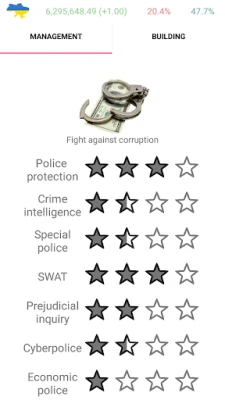
Latest Version
1.0.8
July 01, 2025
Oxiwyle
Games
Android
0
$0.49
com.gosoft.ukrainepremium
Report a Problem
More About Simulator of Ukraine Premium
Unleashing Leadership: A Comprehensive Guide to National Management in a Global Context
In today's complex geopolitical landscape, effective leadership is paramount. This article delves into the essential features of national management, emphasizing the importance of strategic decision-making and the development of key sectors. With a focus on personal safety and integrity, we explore how leaders can foster trust and drive progress in their nations.
Key Features of National Management
Successful governance requires a multifaceted approach. Here are the core components that define effective national management:
1. Management of Eleven Ministries
Efficiently managing various ministries is crucial for a well-functioning government. Each ministry plays a vital role in addressing the needs of the populace, from health and education to defense and infrastructure. Leaders must ensure that these ministries operate cohesively, aligning their objectives with the nation's overall vision.
2. Construction of Factories and Mines
Economic development hinges on industrial growth. By investing in the construction of factories and mines, leaders can stimulate job creation and boost the economy. This not only enhances the nation's productivity but also contributes to self-sufficiency in essential resources.
3. Development of Agriculture
A robust agricultural sector is the backbone of any nation. Leaders should prioritize agricultural development by implementing modern farming techniques, providing support to farmers, and ensuring food security. This not only sustains the population but also opens avenues for export and trade.
4. Warfare and Territorial Expansion
In an increasingly competitive world, the ability to defend national interests is vital. Leaders must be prepared to engage in strategic warfare when necessary, ensuring the protection of their country's sovereignty. Additionally, capturing territories can provide access to valuable resources and strategic advantages.
5. Development of Services
Service sectors, including healthcare, education, and technology, are essential for national progress. Leaders should focus on enhancing these services to improve the quality of life for citizens. Investing in technology and innovation can lead to significant advancements in service delivery.
6. Selection of the Country's Development Path
Every nation must choose its unique development path. Leaders should assess their country's strengths and weaknesses, considering factors such as geography, resources, and cultural heritage. By crafting a tailored development strategy, leaders can guide their nations toward sustainable growth.
Ensuring Personal Safety and Integrity
In the realm of leadership, personal safety is paramount. Leaders must prioritize their security to effectively govern and inspire confidence among their citizens. Additionally, combating corruption is essential for maintaining integrity within the government. By implementing transparent practices and holding officials accountable, leaders can foster a culture of trust.
Building Trust with the People
Trust is the foundation of effective governance. Leaders should engage with their citizens, listening to their concerns and addressing their needs. By promoting open communication and demonstrating a commitment to public welfare, leaders can cultivate a strong bond with the populace.
Conclusion: The Call for Strong Leadership
As the world faces unprecedented challenges, the need for strong leadership has never been more critical. By focusing on key management features, ensuring personal safety, and building trust with the people, leaders can navigate their nations toward a prosperous future. In the case of Ukraine, the call for a decisive and visionary leader is clear. The nation requires someone who can rise to the occasion and steer it through turbulent times.
Good luck, Mr. President! The path ahead is challenging, but with determination and strategic foresight, Ukraine can emerge stronger than ever.
Rate the App
User Reviews
Other Apps in This Category
Popular Apps










Editor's Choice































